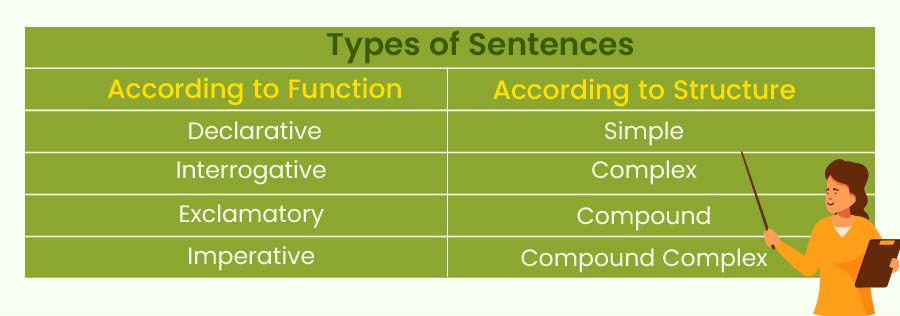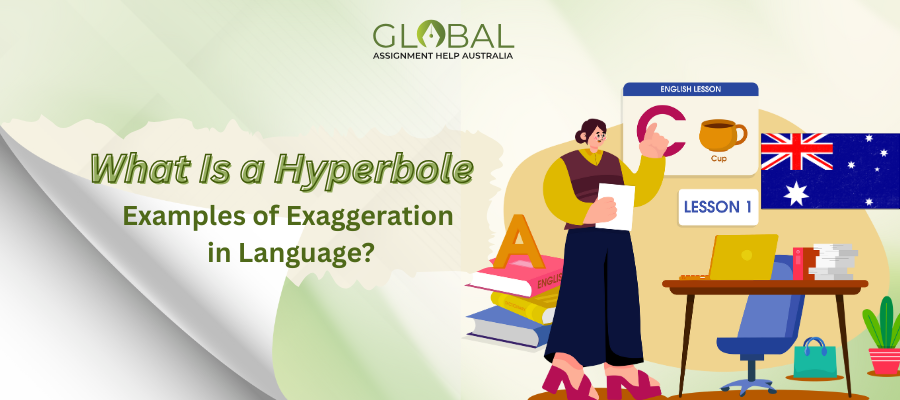 Offers
New
Order Now
Offers
New
Order Now
Sentences are the unsung heroes of communication because they help us to express our emotions, whether it is a frustrated Monday morning, or a feeling of joy after your favorite team wins a match. However, if we talk in literature terms, sentences mean a group of words that make complete sense and help in delivering your message. Moreover, knowing the types of sentences is crucial for learning the appropriate phrases to convey a clear message with the right tone. In this blog, you will learn the types of sentences according to function, and structure. All the types of sentences with examples are explained in this blog with a quiz to test your knowledge about sentences.
Get A+ Grades NowAs written above, sentences are classified in two ways:
So, lets dive into the world of sentences and enhance your knowledge about it.
In this section, we are going to discuss the sentences according to function. These sentences are mostly identified by their end of sentence punctuation. Whether it is a period, question mark, or exclamation mark. There are 4 types of sentences based on function:

Declarative sentences are the most common sentences in the English language. They are the most common type, used to make a statement, provide an explanation, and deliver one or more facts. They always end with a period.
Structure: Subject + verb (what the speaker is doing) + ending in a period.
Examples:
Questions are known formally as interrogative sentences. They are used to ask questions or to request information in the form of answers. They are usually to confirm any doubt regarding or fill in missing information. Always remember, that these sentences end with a question mark.
Structure: There is no specific structure, but they always start with a question word such as what, why, how, and when or a helping verb.
Example:
An exclamatory sentence always ends with an exclamation mark. These sentences are used to communicate great emotions, such as surprise, excitement, anger, and more. Mostly they are used in formal conversations, and writings, or often used as greetings, warnings, and more. They are relatively similar to declarative sentences, but using exclamation marks adds more emotion to the sentence. For instance, I ate a worm, I ate a worm! The first sentence is just a statement, while in the other one, the speaker is trying to convey shocked or proud like emotions.
Structure:
Example:
Go Ahead and Check Out Our Customer Reviews
Imperative sentences are used to give a command, instruction, advice, or to make a request. Such sentence type can end with a period, exclamation mark, or a question mark. It comes down to the emotion behind the message. For instance,
Structure: Verb (base form) + [optional object/complement]
Example:
Get out of my place!
Please can you help me with this task?
Do not forget to be there at five.
So, these were the types of sentences based on their function. Now, we are going to discuss the other type which is based on structure. So, let's jump to the next section and dive into the sentences according to structure.
Sentences based on structures mean how many clauses are used to form a sentence. These sentences are identified by the type of clause used in a sentence. There are two types of clause: Independent and Dependent. You are going to learn about both the clauses in the next section. There are 4 types of sentences based on structure, and these types are:
It is the most basic type of sentence. Simple sentences have only one independent clause and no dependent clause. It communicates only one message about a subject. However, it can have more than a single verb. They are called the most smallish possible grammatically correct sentences.
Structure: Independent Clause
Example:
Complex sentences are different from simple sentences because they have one independent clause and at least one dependent clause. An independent clause can be its sentence, but a dependent clause has to be something related to the independent clause. They are connected with the help of conjunctions or marker words, or using a comma. What are marker words? Marker words are words such as whenever, although, since, while, and more, they are used to show the relationship between clauses.
Structure: Independent Clause + Subordinating Conjunction + Dependent Clause
Example:
In contrast to complex sentences, compound sentences contains two or more independent clauses. In these types of sentences, the clauses are connected with the help of a comma paired with a coordinating junction or by a linking word. Some examples of coordinating junctions are but, yet, nor, or, and, for, etc. Moreover, you can use conjunctive adverbs like therefore, likewise, etc. These sentences are used to write summary paragraphs such as topic sentences, conclusion, and more.
Structure: Independent Clause + Coordinating Junction + Independent Clause
Example:
A compound-complex sentence consists of at least three clauses; two or more independent clauses and at least one dependent clause. These sentences have three sets of subjects and verbs. These are long sentences used to express multiple information. There's no specific order for placing the clauses, it should have at least two independent clauses and one dependent clause.
Structure: Independent clause + Subordinating Conjunction + Dependent Clause + Coordinating Junction + Independent Clause
Example:
So, by now you might have a clear idea of the different types of sentences. So, let's test your knowledge with this interesting quiz below. In this quiz, there are a few examples of various types of sentences, and you have to identify which sentence is of which type.
Questions:
Answers:
Wrapping up, these were the types of sentences, you must have clarity with all the types mentioned in our informative blog. In the above discussion, you must have the understanding to frame better sentences, which can help you enhance your communication skills and your assuring A+ grades with your writing tasks. However, if there's still confusion in the air, you can seek our assistance. We at Global Assignment Help Australia can craft you an effortless and effective academic task. We have tools like AI Essay writer, plagiarism check free, and more, which can ease your writing process. Our team of experts have experience of more than 5 years in writing top-notch write-ups. So, do not miss the opportunity to achieve A+ grades.
You May Also Like To Read:
Primary vs Secondary Sources | Know the Difference
What Is Punctuation Mark? A Handbook to Enhance Your Grammar

Grab this exclusive offer and start your journey to savings today! Act quickly, as this special offer won't be around for long!

This blog explains what is a hyperbole, provides engaging examples, & explores how to use hyperbole.

Explore 150+ funny debate topics to spark laughter, creativity, and lively discussions in 2025

Cross-Sectional Study basics explained with steps, examples, and comparisons.
Limited Time Offer
Exclusive Library Membership + FREE Wallet Balance
1 Month Access !
5000 Student Samples
+10,000 Answers by Experts
Get $300 Now
Update your Number

